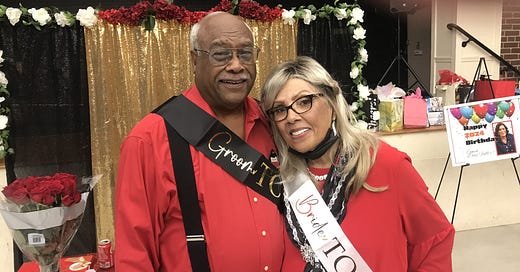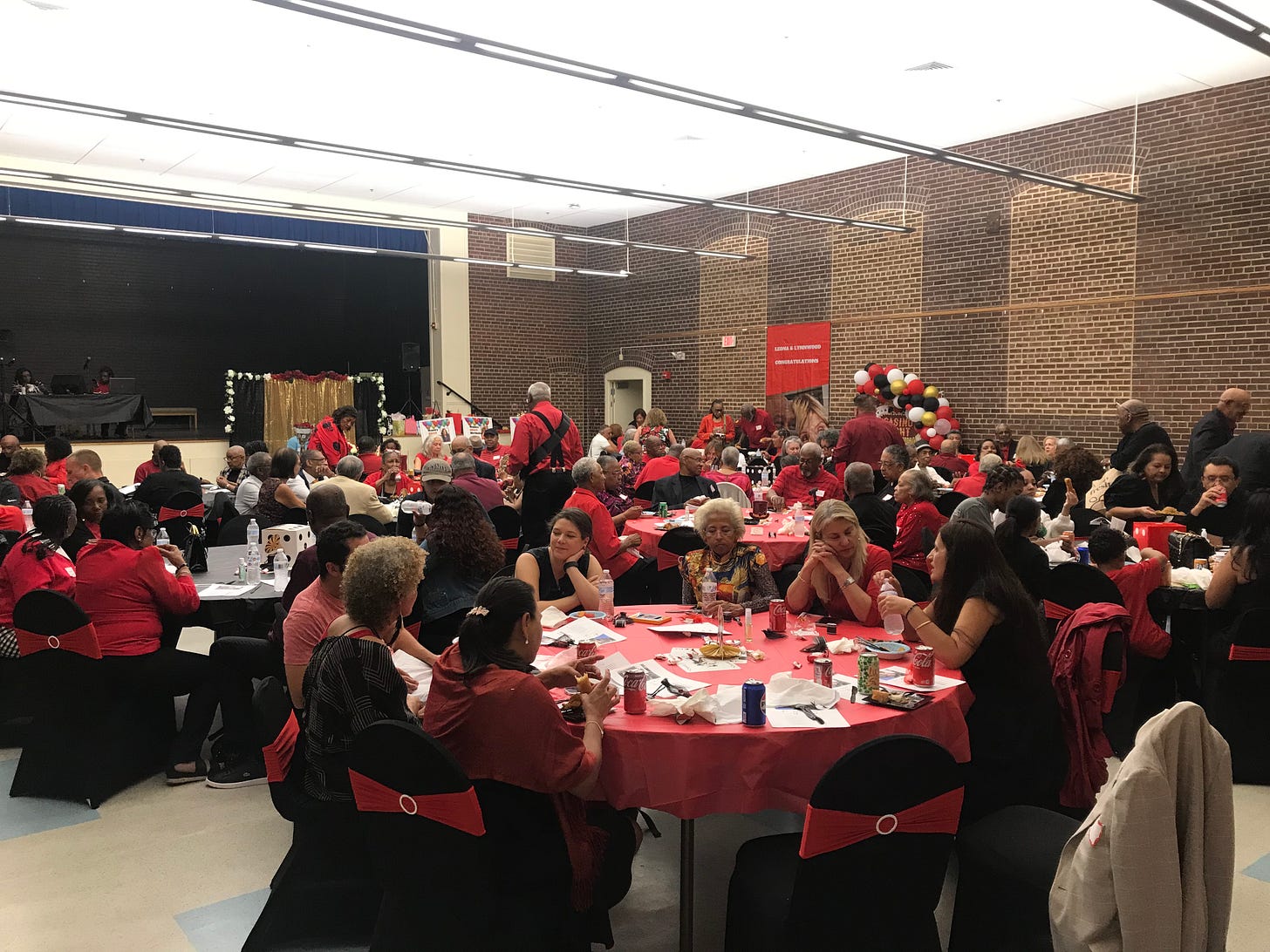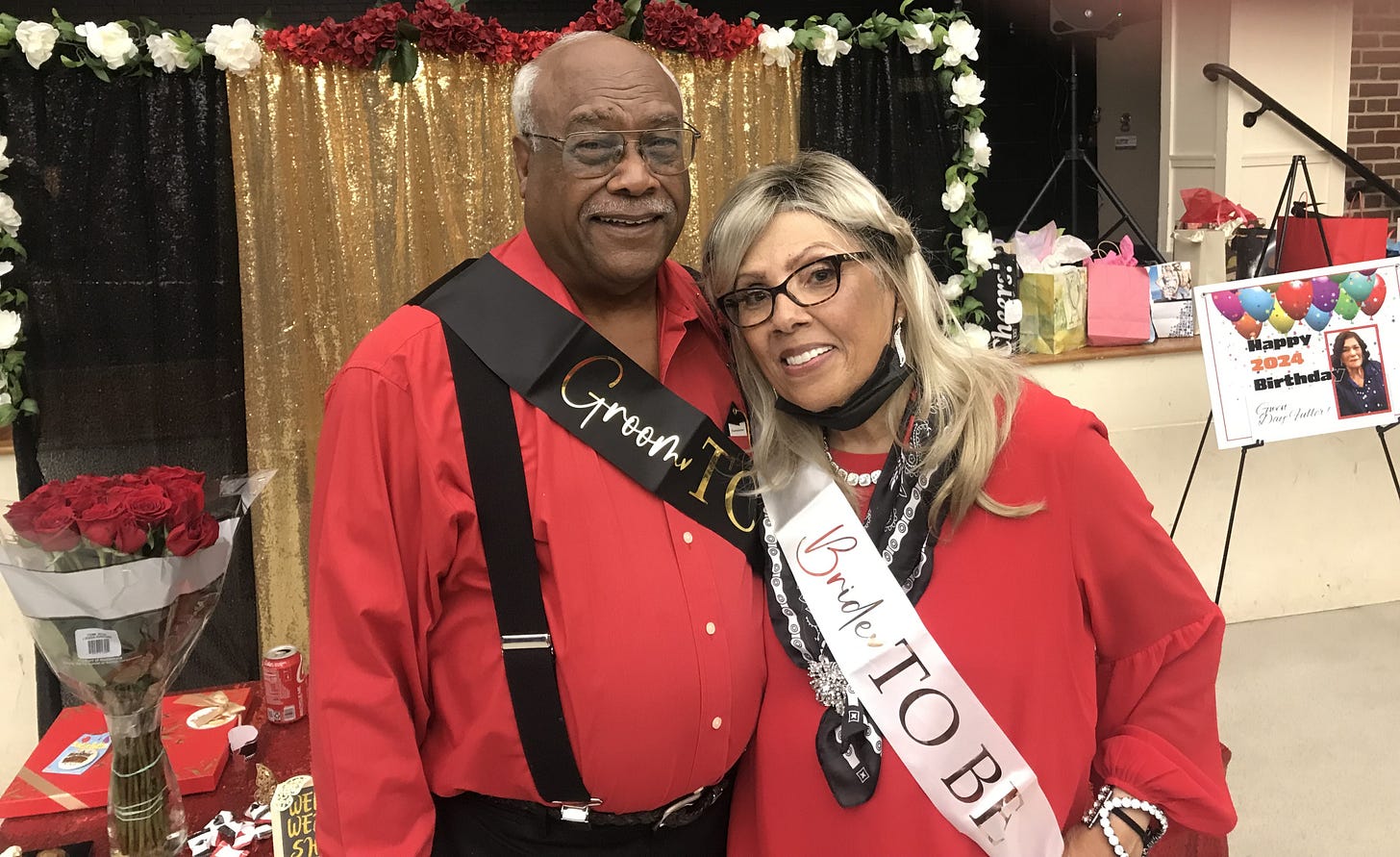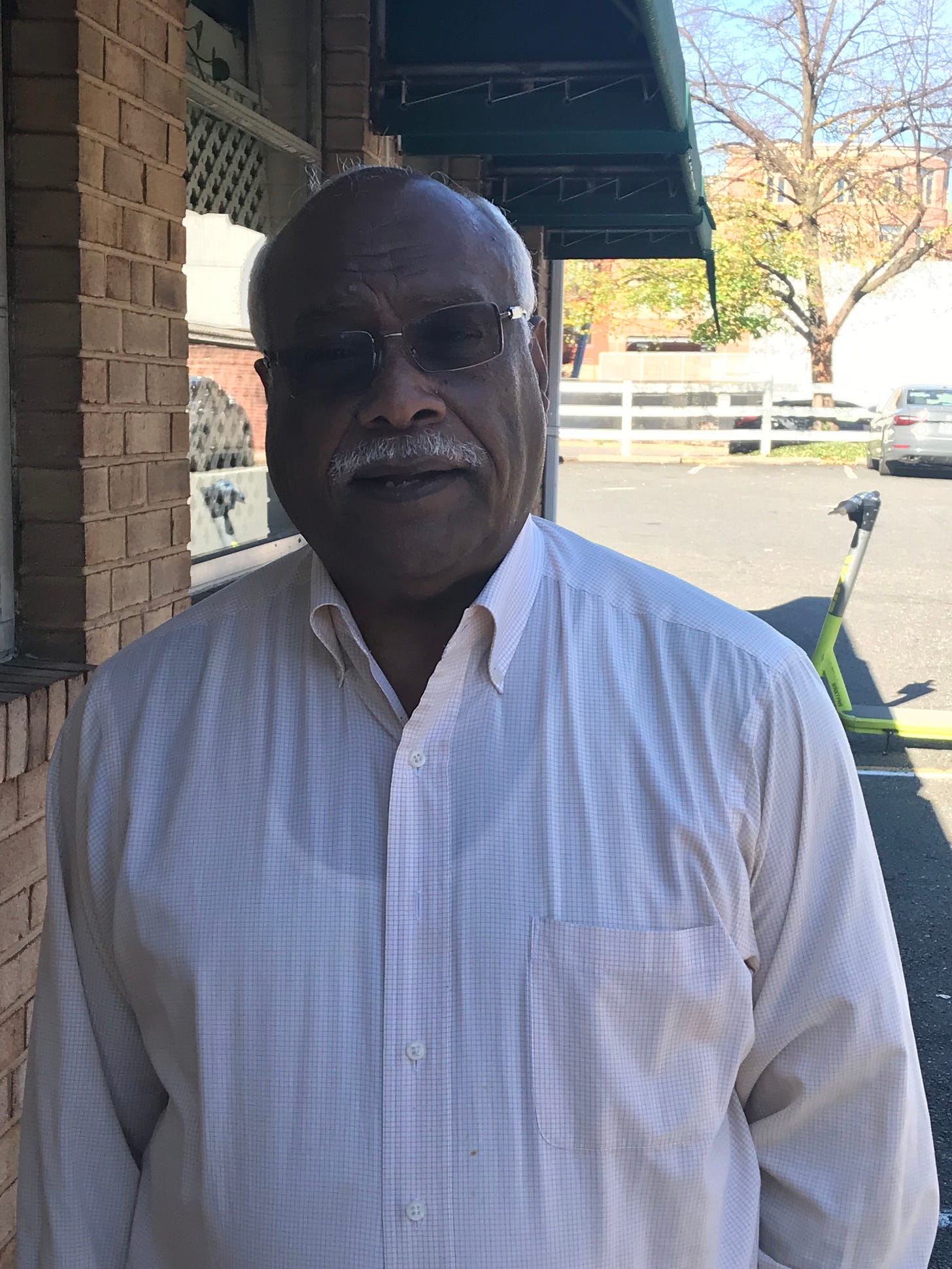Updated: Coffee With Lynnwood Campbell
A native Alexandrian opens a new and happy chapter.
When this post was published in December 2022, Lynnwood Campbell had recently lost his wife of many years. In August 2024, Campbell wrote in a text:
My wife passed two years ago.
A good friend of mine looked up a young lady I dated briefly in college. We had not seen each other for 55 years. She also lost her husband.
We met for breakfast in March 2023. The rest will be history. We are getting married this Thanksgiving.
To underscore this delightful turn of events, the Durant Center was packed to overflowing last Saturday, September 23 for a wedding shower for Campbell and his bride-to-be, Leona T. Weiner. The crowd enjoyed dinner, toasts, a casino night and a red-and black theme:
The wedding couple was suitably attired and looking forward to their November 28 wedding date:
Congratulations, Lynnwood and Leona!
Lynnwood Campbell, a native Alexandrian, has been a quiet and effective advocate in various community roles. He grew up on the 400 block of North Alfred Street in what he describes as an economically and racially diverse neighborhood.
The Campbell family children attended Catholic schools for generations. Campbell was the only African-American student at St. Mary’s School. He recalls other children approaching him in school and saying to their friends, “He is the one.”
Campbell said that in his youth African Americans came to Alexandria from all over Northern Virginia to see movies at the Carver Theater (on the site of what is now Antioch Church of Christ) and to swim at the Johnson Memorial Pool (formerly at the intersection of First and Payne Streets.)
Like many Alexandrians, he is concerned about the rising cost of housing in the city, although he said, “I would never live anywhere else.”
Campbell graduated from Western High School in Georgetown. He graduated from Howard University in February 1970. He earned money for his college tuition by becoming the first African American cashier at a major grocery store in Alexandria. He worked at the A&P in the 1600 block of Duke Street where he was determined to be the fastest cashier in the store. In the summer, he trained cashiers in several A&P stores.
In December 1969, Campbell was hired by Price Waterhouse. Four months later, he went on active duty in the Army. He spent four months in training as a finance officer and then was assigned as a Second Lieutenant to a major’s position as the Deputy Finance and Accounting Officer for the Military District of Washington. At that time Campbell was one of five African American finance officers in the Army.
Campbell returned to Price Waterhouse after serving 21 months on active duty and served as a Captain in the Army Reserves. He became the first African American certified public accountant supervisor in Price Waterhouse’s Washington office.
He left Price Waterhouse to become Vice President and Controller of Capital City Liquors, a wholesaler and importer. At the time, Capital City was the 14th largest African American-owned corporation according to Black Enterprise magazine.
In 1980, Campbell joined the Federal Home Loan Bank Board as an accountant. He was promoted to Director of Accounting and was a frequent speaker at the American Institute of Certified Public Accountants Banking and Savings Loans Conference and at state conferences. He was later promoted to Director of Internal Review and Analysis for the Treasury’s Office of Thrift Supervision.
Campbell was the Office of Thrift Supervision’s Director of Employee and Workplace Principles for three years with responsibility for equal opportunity employment compliance. He trained all of the agency’s equal opportunity counselors.
Campbell became involved with Alexandria’s public schools when an Urban League representative who lived next to Campbell’s mother asked him to review and comment on the ACPS capital budget. He saw that the budget contained money for the future renovations of every school, except Parker-Gray High School. He concluded, based on the allocations of funds in the budget, that the School Board intended to close Parker-Gray. When he said this publicly, a firestorm erupted and he was advised by School Board members and other civic leaders not to “create problems” by suggesting that the school would be closed.
At a Board meeting, Reverend John Peterson, then Pastor of the Alfred Street Baptist Church and a Board member, asked Campbell to explain his reasoning about the potential closing of Parker-Gray, which he did. Peterson later called Campbell to tell him that members of the Board were talking behind his back about closing Parker-Gray.
Campbell was strongly encouraged to apply for the School Board by former City Manager Vola Lawson, former Congressman and Mayor Jim Moran, and then City Councilor Nelson Greene, Sr. At that time, some City Council members insisted that School Board members send their children to the public schools and Moran told Campbell that he would have to remove his daughter from St. Mary’s School. In a late evening City Council meeting, City Councilor Connie Ring, the swing vote, took the time to inquire why Catholic school attendance had been a Campbell family tradition. Campbell explained his family’s tradition of Catholic education. He was confirmed and served on the School Board from 1981 to 1992.
On the School Board, Campbell and Board member Nelson Greene, Jr. were successful in getting the Army to fund the Junior ROTC program at what was then T.C. Williams High School. He was also well ahead of his time in advocating for improved early childhood education. His frank conversations with school and city leaders contributed to ACPS establishing all-day kindergarten and reforming the application criteria for talented and gifted programs and the processes by which teachers were selected to teach those classes.
During his service on the Board, Campbell discovered that there were still Alexandria elementary schools in which classes were segregated by race. His quiet and persistent advocacy helped end this practice.
Campbell continued his public service in the nonprofit sector. Until recently, he was a member of the board of directors of Senior Services of Alexandria where he advocated for program expansion and appropriate benefits for SSA staff.
Campbell said, “I’m no damn activist; I’m an accountant” but he has repeatedly applied his accounting skills and capacity for attention to detail to promote community reforms.







I have never lived in Alexandria, so it's no surprise I've never heard of Lynwood Campbell--but what a great asset for any community!
Lynwood has been long been a strong leader in Alexandria. Glad to call him friend. Glad to have run with him for City Council in 1991. Just wish he had won. He proved, however, that you don't have to be on Council to lead or make a contribution. Lonnie Rich